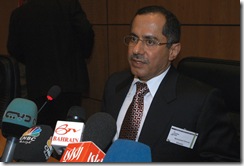Etisalat’s chairman Mohammed Omran has issued a blunt statement setting clear the operator’s position with respect to its investment in Pakistan telco Pakistan Telecommunication Company Limited (PTCL) and the UAE’s telco’s non-payment of almost half of the US$2.6 billion it pledged for a 26 per cent stake of the Pakistan operator in 2006.
Recently media reports have quoted Pakistan’s minister of privatisation, senator Waqar Ahmed Khan, calling for an enquiry into Etisalat’s acquisition of the stake in PTCL.
“The deal (between Etisalat and PTCL) was full of flaws and legal advisers had asked the then government to scrap it, otherwise it would be considered contrary to rules,” Khan is quoted as saying. Omran countered in his statement by saying Etisalat’s investment in PTCL, “came in the wake of a welcome invitation and encouragement by the government of Pakistan to participate in the privatisation process”.
At the beginning of this year Etisalat was reported to be withholding US$1 billion in payments to the Pakistan government over a dispute relating to its purchase of its stake in PTCL. The dispute is over the ownership of properties in Pakistan that were meant to form part of the original deal.
According to the terms of the agreement, Etisalat was due to pay US$1.4 billion within one month of signing the purchase deal and the remaining US$1.2 billion was to be paid in equal instalments over four and a half years, with one instalment every six months.
Responding to the issue of the outstanding purchase price, Omran said that under the terms of the deal, Etisalat is entitled to withhold payments until the property titles are transferred to PTCL.
“Our aim is to ensure that PTCL receives clean title to and possession of all properties. We are confident that when the privatisation commission fulfils this obligation, Etisalat will immediately release the instalments,” he said.




